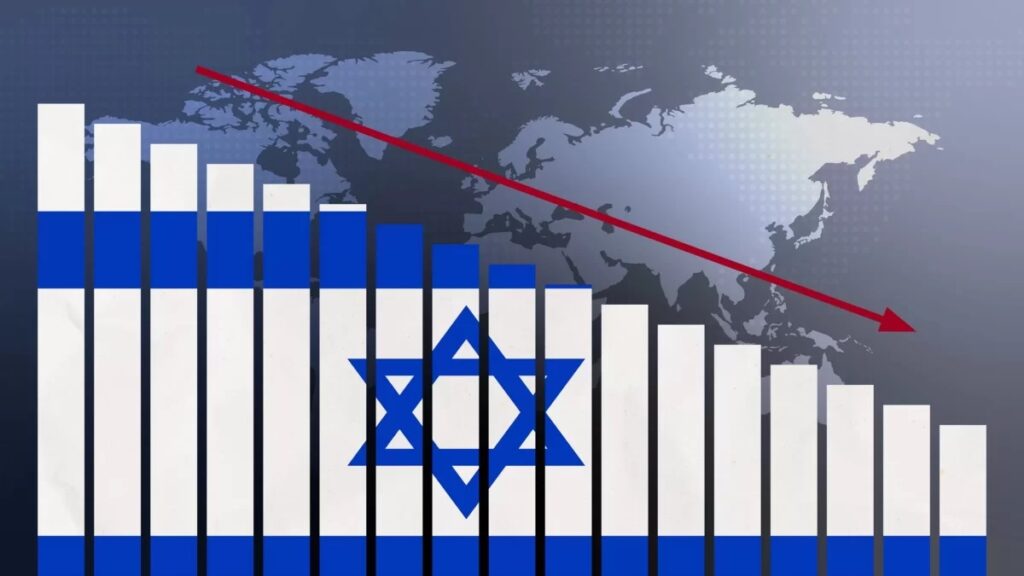Watan-Data from the Israeli Ministry of Finance shows that the fiscal deficit shrank to 5.3% of GDP in February 2025, down from 5.8% in January. However, it remains above the government’s target of 5% of GDP as set in the 2025 budget, which has yet to be fully approved, according to the Calcalist newspaper.
Over the past 12 months, the cumulative deficit reached approximately 108 billion shekels ($29.5 billion), down from around 115 billion shekels ($31.4 billion) in January. The monthly deficit for February stood at about 6.1 billion shekels ($1.67 billion), which is half the level recorded in the same month of 2024—a year marked by intense war that sharply increased the fiscal deficit.
The data indicates that tax revenues in February 2025 dropped by 38% compared to January, totaling around 39 billion shekels ($10.6 billion), slightly below last year’s annual average of approximately 40 billion shekels ($10.9 billion).
The Ministry of Finance attributed this decline to a sharp 6% drop in indirect taxes after an exceptionally high collection of around 63 billion shekels ($17.2 billion) in January, which was driven by broad tax changes, including increases in VAT and car taxes.

Government Spending Under Pressure
According to Calcalist, government expenditures in February amounted to approximately 46 billion shekels ($12.5 billion), bringing total government spending since the beginning of the year to around 86 billion shekels ($23.4 billion), close to the temporary budget ceiling of 87.3 billion shekels ($23.7 billion). This reflects a 5% decline compared to February 2024, when an expansionary budget was in place.
Israel One Year After “Al-Aqsa Flood”
Despite the overall decline in public spending, government expenditures in February increased by 14% compared to January. The government took advantage of spending cuts in some sectors to pay off debts amounting to approximately 9 billion shekels ($2.45 billion).
Israel’s Economic Slowdown
According to the Israeli Central Bureau of Statistics, Israel’s economy recorded weak growth of 0.9% in 2024, below the initial estimate of 1%. The fourth-quarter growth rate was revised down to 2% from a previous estimate of 2.5%, as reported by Reuters.
Additionally, the third-quarter growth rate was revised down to 5% instead of 5.3%. The Central Bureau of Statistics noted that GDP per capita declined by 0.4% in 2024, reflecting weak overall economic performance.
Gaza and Southern Lebanon Strained the Economy
Israel’s war on Gaza since October 2023, along with subsequent military escalation with Hezbollah in southern Lebanon, has impacted the entire Israeli economy. The war led to increased military spending, higher security costs, and an overall climate of economic uncertainty.
A ceasefire in Gaza came into effect on January 19, 2025, while a truce with Hezbollah was reached on November 27, 2024. However, the economic consequences of the war continue to weigh on public finances and economic growth, with military spending being a major burden on last year’s budget.
Calcalist reports that despite significant economic challenges, the Central Bureau of Statistics expects GDP growth to reach around 4% this year. However, this projection heavily depends on the government’s ability to restore fiscal balance, stimulate growth, and reduce the growing deficit.
Nevertheless, challenges remain, particularly with declining investor confidence, slowing foreign trade, and ongoing pressure on the business sector, making the government’s growth target more difficult to achieve than expected.
Moreover, any new security escalation could lead to further economic downturns, exacerbating Israel’s financial instability, according to experts.
